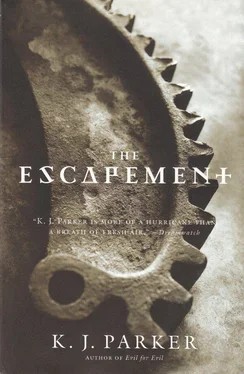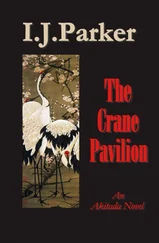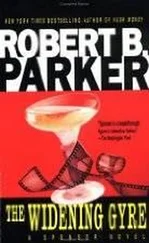K Parker - The Escapement
Здесь есть возможность читать онлайн «K Parker - The Escapement» весь текст электронной книги совершенно бесплатно (целиком полную версию без сокращений). В некоторых случаях можно слушать аудио, скачать через торрент в формате fb2 и присутствует краткое содержание. Жанр: Фэнтези, на английском языке. Описание произведения, (предисловие) а так же отзывы посетителей доступны на портале библиотеки ЛибКат.
- Название:The Escapement
- Автор:
- Жанр:
- Год:неизвестен
- ISBN:нет данных
- Рейтинг книги:4 / 5. Голосов: 1
-
Избранное:Добавить в избранное
- Отзывы:
-
Ваша оценка:
- 80
- 1
- 2
- 3
- 4
- 5
The Escapement: краткое содержание, описание и аннотация
Предлагаем к чтению аннотацию, описание, краткое содержание или предисловие (зависит от того, что написал сам автор книги «The Escapement»). Если вы не нашли необходимую информацию о книге — напишите в комментариях, мы постараемся отыскать её.
The Escapement — читать онлайн бесплатно полную книгу (весь текст) целиком
Ниже представлен текст книги, разбитый по страницам. Система сохранения места последней прочитанной страницы, позволяет с удобством читать онлайн бесплатно книгу «The Escapement», без необходимости каждый раз заново искать на чём Вы остановились. Поставьте закладку, и сможете в любой момент перейти на страницу, на которой закончили чтение.
Интервал:
Закладка:
His colleagues, subordinates, subjects had done all that; Psellus, by contrast, had spent those illusory fourteen days doing very little, at least by his own reckoning. He'd met people-the Cure Doce ambassador, scouts, the heads of departments-all of whom had told him in great detail what was being done, by other people. He'd listened and soaked in the information, until he felt quite bloated with details; but he hadn't actually done anything.
Instead, he'd sat and wrestled with the book. The text was bad enough; he'd finally figured out what palisades, cuvettes, cordons, scarp and counterscarp revetments, embrasures and escalades were, but he still couldn't get his poor head around counterforts or ecluses. It was the pictures, though, that haunted him. The shapes were just shapes; abstracts, symmetrical patterns of lines, essays in the geometry of violence, manmade and unnatural-except that they kept reminding him of things, and that was what was so disturbing. The bastion with complex ravelins assailed by saps and defended by countermines, for example, put him in mind of the head of an insect, with multiple eyes and projecting feelers, while other formations and patterns were stars or snowflakes, perfect but encumbered with strange and malevolent growths swelling out of them, grotesque and disgusting in a way that no picture of people or animals could ever be. At times, he caught himself feeling afraid of the book; savages and primitives believed in books that could suck your soul out through your eyes as you read them, books that could wrap their pages round your head and swallow you, words that crawled into your brain like tapeworms. Of course, he wasn't a primitive or a savage.
Saps; they, he was beginning to understand, were the real danger. If everything in the Grand Over-Arching Schedule actually happened, the City would be safe from Vaatzes' stone-throwers (not for ever, but for long enough; query, however, whether time fences in a straight line or a circle); and all the enemy had to do in order to be safe from the City's engines was to fall back a hundred yards or so. Artillery, then, was a negatable threat, and once both sides had figured that out (he had a depressing feeling they wouldn't take his word for it and save themselves the effort), the war would go underground and start burrowing, like maggots.
The book had plenty to say about sapping; about mines, countermines, camouflets, petards, galleries, stanchions and globes of compression. The basic idea was very simple: dig a tunnel under a wall. To keep it from caving in while you're building it, you need to hold up the roof with wooden props; when you've finished, you pack the end of the tunnel, directly under the foundations of the wall, with straw, brushwood and scrap lumber, all thoroughly soaked in lamp oil. Strike a spark and run; the fire burns through the props, down comes the roof, and the ensuing subsidence topples the wall.
Try that with a solid bank of earth, of course, and you achieved very little-a few dimples, maybe a crater, but nothing you could send an army into and hope ever to see it again. The book was ruthlessly straightforward when it came to proposing a countermeasure: first, storm the bastion. That was the point at which Psellus closed the book. He wasn't quite sure why, or at least he couldn't reduce it to words, but it was something to do with the thought of the unspeakable degree of effort involved-first storm the bastion, then start digging tunnels, where necessary chipping through any solid rock that might be encountered in the process. The thought of it-the work, the slaughter, the sheer weight of dirt to be shovelled into baskets in the dark and carried-made him feel sick. He looked at the pictures and saw the heads of insects; he read about sapping, and thought about ants. It was all too inhuman.
(Also, pointless; but it would have to be done, even though it wouldn't win the war. Only a letter could do that.)
Well, there was still time. He could force himself to read the rest of the book later, when it became unavoidable. In the meantime, he submerged himself with an enthusiasm little short of joy in banal, tedious administration, like a fish thrown back into the water by an angler. His clerks glared at him behind his back, of course. They felt that his insistence on doing routine paperwork that should have been their job was intended as a criticism. He felt bad about that; but he needed the columns of figures to soak up the diagrams that lingered in his head, like sawdust on spilled blood.
From time to time he wasted a sheet of paper trying to write the letter. The clerks learned to stay out of his way on such occasions. Iosao Phryzatses, chief scout. As the door opened, he was expecting to see a spare, weatherbeaten man in worn buckskin and knee-length boots. Instead…
"Thank you for finding the time to see me," he heard himself say. "I'm sure you're very busy at the moment."
The little round man frowned, very slightly. "No, not particularly," he said, and stood perfectly still next to the empty chair, until Psellus remembered his manners and asked him to sit. He sat down-expertly, there was no other word for it. The slightest of movements, and he'd gone from a man standing to a man sitting. Psellus was tempted to make him stand up, just so he could watch him do it again.
"Now then," he said, trying to sound brisk. "Your latest report."
Phryzatses nodded, another tiny movement, then went back to being perfectly still. He was dressed in ordinary City clothes, plain but brand new and of the best quality of cloth allowed for that particular cut under Specification. His shoes glowed.
"The situation at Vassa," Psellus said. "I don't suppose you remembered to bring-"
Before he had a chance to finish the sentence, Phryzatses' rather chubby hand vanished inside his jacket and came out with a slim brass tube, which he tapped smartly on the edge of the desk. Out of one end popped the edge of a roll of paper. He teased it out with his precisely trimmed fingernails, unrolled it and smoothed it out with the side of his hand. "The map," he said.
"Thank you." Psellus reached for it, glanced at it. He had trouble with maps.
"That's north." Phryzatses touched one edge of the paper with his fingertip.
"Ah, yes."
The whole idea of maps was somehow disconcerting; because how could you possibly draw one? You'd have to breed giant eagles whose backs you could ride on, to get up high enough to see. Otherwise, he couldn't figure out how it was possible. It'd be like drawing with your eyes shut (though he believed that was possible, too).
But never mind. "So this is the river," he heard himself say, "and these must be the new roads they're building. Sorry, where's the iron mine?"
"Weal Calla," Phryzatses said. "There, look."
"Oh, I see, that sort of star shape is a mine." Psellus frowned, aware that he probably wasn't making a terribly good impression. But that didn't matter any more, did it? "So this must be the silver mine here. What's the scale, by the way?"
"An inch to a mile." From inside his coat, Phryzatses produced a small, elegant pair of callipers, Pattern Ninety, with an incised calibrated scale. Psellus took them and twirled them about for a bit, to show willing. "Thank you," he said. "So much easier if you've got a map," he lied. "Now, you said in the report, about these new buildings here…" He touched the little blobs which he took to represent the buildings with the leg of the callipers. "I take it…"
"The new buildings aren't actually shown on the map," Phryzatses said. "What you're pointing at is a string of dew-ponds, as you can see from the key at the bottom. There's a little number seven, look, and-"
"Ah, yes." He didn't bother looking. "So these new sheds would be…"
"Here."
A fingernail, pressed on a piece of paper. Psellus looked at it anyway.
Читать дальшеИнтервал:
Закладка:
Похожие книги на «The Escapement»
Представляем Вашему вниманию похожие книги на «The Escapement» списком для выбора. Мы отобрали схожую по названию и смыслу литературу в надежде предоставить читателям больше вариантов отыскать новые, интересные, ещё непрочитанные произведения.
Обсуждение, отзывы о книге «The Escapement» и просто собственные мнения читателей. Оставьте ваши комментарии, напишите, что Вы думаете о произведении, его смысле или главных героях. Укажите что конкретно понравилось, а что нет, и почему Вы так считаете.












